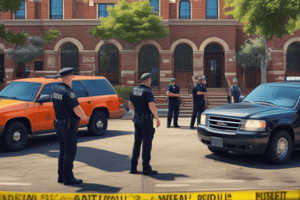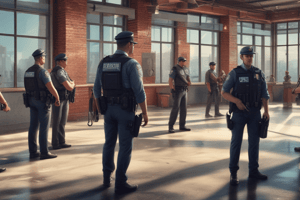Podcast
Questions and Answers
What is the primary focus of an officer's preparation at home?
What is the primary focus of an officer's preparation at home?
- Reviewing previous shift's reports
- Personal appearance and mental preparation (correct)
- Planning patrol routes
- Equipment checks
What is an essential part of an officer's uniform check?
What is an essential part of an officer's uniform check?
- Making sure the body armor is properly worn (correct)
- Checking the patrol car's gas level
- Ensuring the flashlight is fully charged
- Verifying the duty weapon's serial number
What is a recommended personal item for an officer to carry?
What is a recommended personal item for an officer to carry?
- A first-aid kit
- A camera
- A non-metallic whistle (correct)
- A spare set of handcuffs
What is a source of information that an officer can use to maintain awareness of activity in their patrol area?
What is a source of information that an officer can use to maintain awareness of activity in their patrol area?
What is an important question for an officer to ask themselves during mental preparation at home?
What is an important question for an officer to ask themselves during mental preparation at home?
What is an important check for an officer to make prior to departing the station for their patrol area?
What is an important check for an officer to make prior to departing the station for their patrol area?
What is the purpose of using descriptive models in criminal investigation?
What is the purpose of using descriptive models in criminal investigation?
What is the immediate physical response to a perceived threat?
What is the immediate physical response to a perceived threat?
What is the goal of autogenic breathing techniques?
What is the goal of autogenic breathing techniques?
What is the main purpose of crisis rehearsal?
What is the main purpose of crisis rehearsal?
What is Condition White in the Awareness Spectrum?
What is Condition White in the Awareness Spectrum?
Why do police officers need to handle non-criminal assignments?
Why do police officers need to handle non-criminal assignments?
What is the importance of a professional demeanor in non-criminal assignments?
What is the importance of a professional demeanor in non-criminal assignments?
What is the result of autogenic breathing techniques and visualization?
What is the result of autogenic breathing techniques and visualization?
What is the purpose of separation in handling witnesses?
What is the purpose of separation in handling witnesses?
What is the benefit of mental preparedness in crisis situations?
What is the benefit of mental preparedness in crisis situations?
What is one of the items that should be included in the small tool kit?
What is one of the items that should be included in the small tool kit?
Why is it essential to know directions and geographical locations on patrol duty?
Why is it essential to know directions and geographical locations on patrol duty?
What is the primary purpose of roll-call?
What is the primary purpose of roll-call?
What is a 'Problem Area' in the context of police duty?
What is a 'Problem Area' in the context of police duty?
What is 'Focus Point' in the context of police duty?
What is 'Focus Point' in the context of police duty?
What is the definition of 'Observation' in the context of police duty?
What is the definition of 'Observation' in the context of police duty?
What is one of the internal factors that can affect observation and perception?
What is one of the internal factors that can affect observation and perception?
Why is an accurate description vital in patrol?
Why is an accurate description vital in patrol?
What is one of the essential items that should be checked during a vehicle check?
What is one of the essential items that should be checked during a vehicle check?
What is the principle of 'North-by-Northwest'?
What is the principle of 'North-by-Northwest'?
What is the primary goal when dealing with an emotionally disturbed person?
What is the primary goal when dealing with an emotionally disturbed person?
What is a common circumstance that requires police involvement when dealing with an emotionally disturbed person?
What is a common circumstance that requires police involvement when dealing with an emotionally disturbed person?
When communicating with an emotionally disturbed person, what is an effective technique?
When communicating with an emotionally disturbed person, what is an effective technique?
What is cognitive impairment defined as?
What is cognitive impairment defined as?
What is a common symptom of cognitive impairment?
What is a common symptom of cognitive impairment?
When dealing with a cognitively impaired individual, what is an important consideration?
When dealing with a cognitively impaired individual, what is an important consideration?
What is the primary focus of autogenic breathing?
What is the primary focus of autogenic breathing?
What is Condition Yellow in the Awareness Spectrum?
What is Condition Yellow in the Awareness Spectrum?
When responding to a missing person, what is the first step an officer should take?
When responding to a missing person, what is the first step an officer should take?
What should an officer do when responding to a person with cognitive impairment?
What should an officer do when responding to a person with cognitive impairment?
What is the primary goal when responding to a person down?
What is the primary goal when responding to a person down?
How should an officer respond to a chronic complaint?
How should an officer respond to a chronic complaint?
What should an officer do when responding to an animal bite?
What should an officer do when responding to an animal bite?
What is the primary focus of an officer's response to a lost or stranded person?
What is the primary focus of an officer's response to a lost or stranded person?
What is the purpose of consulting department policy in various scenarios?
What is the purpose of consulting department policy in various scenarios?
What is the primary goal of an officer's response to a person in distress?
What is the primary goal of an officer's response to a person in distress?
What type of incidents should be considered for additional investigation?
What type of incidents should be considered for additional investigation?
What is the importance of a thorough preliminary investigation by a patrol officer?
What is the importance of a thorough preliminary investigation by a patrol officer?
What should an officer consider during mental preparation before starting a shift?
What should an officer consider during mental preparation before starting a shift?
What is an important aspect of a patrol officer's daily routine?
What is an important aspect of a patrol officer's daily routine?
What should an officer check for during a vehicle check?
What should an officer check for during a vehicle check?
What is the principle of 'north-by-northwest'?
What is the principle of 'north-by-northwest'?
What is the purpose of discussing changes in policy and procedure during a roll call?
What is the purpose of discussing changes in policy and procedure during a roll call?
What is a 'problem area' in terms of risk assessment?
What is a 'problem area' in terms of risk assessment?
What is the purpose of autogenic breathing and visualization?
What is the purpose of autogenic breathing and visualization?
What is an essential aspect of an officer's safety and effectiveness?
What is an essential aspect of an officer's safety and effectiveness?
When investigating a missing person, what should be done after a reasonable time has elapsed?
When investigating a missing person, what should be done after a reasonable time has elapsed?
Which organization provides 'Harbor House' shelter for homeless?
Which organization provides 'Harbor House' shelter for homeless?
What is the primary goal when dealing with an Emotionally Disturbed Person (EDP)?
What is the primary goal when dealing with an Emotionally Disturbed Person (EDP)?
What is the first step when investigating a missing child?
What is the first step when investigating a missing child?
When dealing with a person with cognitive impairment, what should be assumed?
When dealing with a person with cognitive impairment, what should be assumed?
What should you do when encountering an emotionally disturbed person?
What should you do when encountering an emotionally disturbed person?
What is the primary goal when dealing with a person down (fallen)?
What is the primary goal when dealing with a person down (fallen)?
Why should you expect to feel some fear when dealing with an EDP?
Why should you expect to feel some fear when dealing with an EDP?
When investigating a sick or injured person, what should be done in most instances?
When investigating a sick or injured person, what should be done in most instances?
What is the recommended approach when interacting with a person with cognitive impairment?
What is the recommended approach when interacting with a person with cognitive impairment?
What is the primary goal when dealing with a chronic complaint?
What is the primary goal when dealing with a chronic complaint?
What is the most common cause of cognitive impairment?
What is the most common cause of cognitive impairment?
What should you do when encountering a confused older adult in the community?
What should you do when encountering a confused older adult in the community?
What should be done when dealing with an animal bite?
What should be done when dealing with an animal bite?
What should be done when dealing with lost or stranded travelers?
What should be done when dealing with lost or stranded travelers?
Why should you not leave a cognitively impaired individual alone or drop them off at a location?
Why should you not leave a cognitively impaired individual alone or drop them off at a location?
What is the importance of knowing departmental policies?
What is the importance of knowing departmental policies?
What is the purpose of the Ministerial Alliance?
What is the purpose of the Ministerial Alliance?
What should an officer do when dealing with a person who is sick or injured due to sickness or injury?
What should an officer do when dealing with a person who is sick or injured due to sickness or injury?
What should you do when handling an EDP case?
What should you do when handling an EDP case?
Flashcards are hidden until you start studying
Study Notes
Preparation for Duty
- Begins at home with personal appearance, hygiene, and mental preparation
- Consider significant events from the previous shift that may need follow-up
- Identify tasks to accomplish during the shift
- Think about personal problems that may interfere with the shift
- Identify individuals to be checked on
Personal Equipment Check
- Uniform:
- Worn properly, including body armor
- Clean, pressed, and properly fitted
- Cap bill wiped, shoes shined
- Duty weapon:
- Loaded
- Reserve ammunition easily accessible
- Handcuffs:
- Easily accessible
- Extra pair if possible
- Other equipment:
- Whistle (non-metallic)
- Dependable flashlight
- Baton
Preparation at the Station
- Four sources of information to maintain awareness of patrol area activity:
- Roll calls and teletypes
- Precinct/district desk books
- Vehicle hot sheets
- Officer going off duty (determine what happened on their shift)
Equipment Checks
- Incidental equipment:
- Book of citations
- Copy of traffic codes
- Updated departmental manual
- Copies of report forms
- Extra ammunition
- Small tool kit
- Chalk
- Tweezers
- Tape
- Plastic bags
- Vehicle check:
- Check for damage/defects
- Check lights and emergency equipment
- Check for required equipment (e.g., first aid kit, fire extinguisher, shotgun combat loader)
- Check for contraband (e.g., under seats, between seat cushions)
Locating Addresses and Directions
- Principle of "North-by-Northwest":
- Odd-numbered addresses appear on either the north or west side of the street
- Even-numbered addresses appear on either the south or east side of the street
- Importance of knowing jurisdiction and navigating it quickly and safely
Roll-Call Purposes
- Discuss changes in policy and procedure
- Discuss specific directed patrol
- Disseminate crime bulletins, hot sheets, and current "wanted" information
- Assess manpower
- Officially inspect uniform, equipment, and weapon
Reaction to Perceived Threats
- Problem Area:
- Defined as any person, object, or site that may produce a hazard
- Reaction: prompt identification of the threat and its potential
- Area of Responsibility:
- Defined as the exact location within a "problem area" from which an attack could emanate
- Reaction: detect and control any threat that emanates from it
- Focus Point:
- Defined as a clear and present threat that must be immediately controlled
- Reaction: concentrate attention, energy, and skill against the focus point
Observation and Perception
- Factors affecting observation and perception:
- External factors (e.g., distance, lighting, weather conditions)
- Internal factors (e.g., physiological states, emotional/psychological states)
- Importance of accurate description, especially in patrol duties
Autogenic Breathing and Visualization
- Techniques for reducing stress and increasing effectiveness
- Autogenic breathing: slow, deliberate four-count inhaling and exhaling while visualizing warmth radiating throughout the body
- Visualization: mental role-playing with option reinforcement to program the brain for effective crisis management
Conditions of the Mind
- Levels of consciousness:
- Condition White: mind is internalized and not focused on the environment
- Condition Yellow: mind is relaxed and alert, scanning the environment
- Condition Orange: mind is ready for danger, focused on one problem or threat
- Condition Red: mind is ready to fight or flee, fully focused on one problem or threat
- Condition Black: in a catatonic state, unable to focus
Calls for Service
- Non-criminal assignments:
- Handling emergencies and providing service to the public
- Importance of maintaining a professional demeanor
- Common assignments:
- Missing person
- Missing child
- Person with cognitive impairment
- Person down (fallen)
- Chronic complaint
- Animal bite
- Lost/stranded travelers
- Support services:
- Red Cross
- Salvation Army
- Local church groups
- Treat individuals as you would want your family to be treated
Emotionally Disturbed Persons (EDP)
- Goal: get the person to a treatment facility or medical attention
- Circumstances requiring police involvement:
- Receiving a call for an EDP
- Receiving a call for an EDP causing or threatening harm
- Encountering an EDP by accident
- Handling an EDP case:
- Remove family or friends from the area
- Use an "initiator" and "distractor" approach
- Listen attentively to the subject
- Gradually try to calm the subject
- Expect to feel fear and act confidently
- Know department policy on handling EDP situations
Cognitive Impairment
-
Definition: confusion or memory loss in an adult
-
Common causes:
- Dementia
- Alzheimer's disease
-
Symptoms:
- Short-term memory loss
- Confusion
- Disorientation
- Inability to retrace steps
- Communication deficits
-
Circumstances requiring police involvement:
- Confused older adult found in the community
- Search required for a missing individual with cognitive impairment
- Cognitively impaired individual becomes lost while driving or involved in a motor vehicle accident
- Importance of transporting the individual to a medical facility### Dissemination of Crime Information
-
Disseminate crime bulletins, hot sheets, and current "wanted" information
-
Assess manpower and officially inspect uniform equipment and weapon
Risk Assessment and Reaction
- Identify problem areas, which are persons, objects, or sites that may produce a hazard
- React to problem areas by promptly identifying the current threat and potential threat
- Identify areas of responsibility, which are exact locations within a problem area from which an attack could emanate
- Detect and control threats emanating from areas of responsibility
- Focus on clear and present threats, concentrating attention, energy, and skill against them
Stress Management
- Use autogenic breathing to reduce stress, which involves slow, deliberate, 4-count inhaling and exhaling while visualizing warmth radiating throughout the body
Awareness Spectrum
- Condition White: environmental unawareness (daydreaming or preoccupation)
- Condition Yellow: relaxed but alert, conscious but not tense
- Condition Orange: alarm
- Condition Red: what appears to be wrong is actually wrong
- Condition Black: panic, misdirected frenzy, and paralysis
Police Service and Assistance
- Provide good service and assistance to the public by showing concern and demonstrating interest in citizens' problems
Missing Persons
- Record all information provided by the reporting party
- Advise the reporting party how to check with hospitals where unidentified injured persons may have been taken
- Consult department policy and commence an investigation if there is evidence or strong reason to suspect foul play
Missing Children
- Make every effort to verify that the child is lost and not a runaway
- Find out whether there was an argument between parents or other family members
- Note past problems and past places where the child was found
- Get all information possible and relay it to the radio dispatcher
- Radiate the search out from the area where the child was last seen
- Consult department policy
Persons with Cognitive Impairment
- Conduct a search of the immediate area
- Assume the missing person is missing and endangered
- Follow departmental protocols to enact the Endangered Silver Advisory
- Collaborate with the department and caregivers to procure additional community resources
Person Down
- Attempt to determine the cause of the subject's condition
- Initiate first aid and have the subject conveyed to a hospital if necessary
- Notify emergency contacts
- Consult department policy
- If arrest is necessary, effect the same
Sick/Injury
- Same procedure as person down, but in most instances, an arrest situation would be remote
Chronic Complaint
- Ascertain whether the matter is criminal or civil in nature
- If criminal, investigate and enforce laws
- If civil, ensure it does not present hazardous circumstances
Animal Bite
- Initiate first aid, if necessary
- Have the victim conveyed to the nearest hospital as quickly as possible
- Contact animal control service to have the animal quarantined
- Consult department policy
Lost/Stranded Persons
- Give or ascertain directions if needed
- Provide assistance in contacting outside agencies such as taxi or tow
- Provide assistance in contacting relatives or friends
- If the subject is confused due to sickness or injury, have them conveyed to a hospital
EDP (Emotionally Disturbed Person)
- The goal is to get the person to a treatment facility
- Circumstances that often require police involvement include:
- Receiving a call for a person acting irrationally
- Receiving a call for an emotionally disturbed person causing or threatening harm to others
- Receiving a call for an emotionally disturbed person causing or threatening harm to themselves
- Encountering an emotionally disturbed person while on routine patrol
Communicating with EDP
- Remove any family or friends of the subject from the immediate area
- Use an "initiator" and "distracter" approach
- Let the subject rant and rave if they want to
- Gradually try to calm the subject
- Listen to the subject attentively to detect underlying messages
- Don't make sudden moves, unless it is a control move
- Expect to feel some fear, as it is nature's way of giving you a "forewarning to be forearmed"
- Act confident and think "survival" if you get punched, kicked, or bitten
Cognitive Impairment
- Defined as confusion or memory loss in an adult
- Commonly caused by dementia, with Alzheimer's being the most recognized form
- Symptoms include short-term memory loss, confusion, disorientation, inability to retrace steps, and communication deficits
Circumstances Requiring Police Involvement
- Confused older adult "found" in the community and not noted as missing
- Search required for a missing individual with cognitive impairment
- Cognitively impaired individual becomes lost while driving or involved in a motor vehicle accident
- Cognitively impaired individuals should never be left alone or dropped off at a location without a caregiver being made aware
- Transport to a medical facility is the appropriate course of action when necessary
Studying That Suits You
Use AI to generate personalized quizzes and flashcards to suit your learning preferences.




